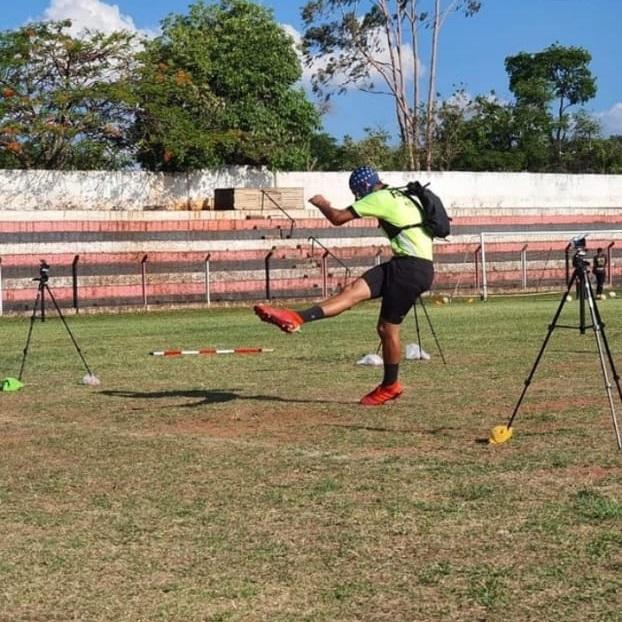Article published by Brazilian researchers in Sports Medicine presents a systematic review of scientific studies on the topic

Credit: Laboratório de Pesquisa em Movimento Humano/UNESP
Brazilian researchers have published a systematic review of the scientific literature showing that some warm-up strategies such as dynamic stretching can effectively prepare soccer players to maintain kicking accuracy, whereas intense physical exercises have a negative effect on the velocity of the ball when kicked, and consumption of carbohydrate beverages during a match can enable players to maintain adequate kicking performance in the concluding moments of prolonged physical exercise such as a sudden-death playoff.
The review, published in the journal Sports Medicine in December 2020, analyzed 52 studies, ten of which examined the acute effects of warm-up exercises while 34 verified the overall impact of physical training and 21 explored recovery-related strategies.
Proficient kicking is essential in soccer, especially to score goals. The top three clubs in round 30 of the 2020 Brazilian Championship, for example, had taken 162, 132 and 169 shots at goal respectively in the matches played so far, scoring 50, 48 and 51 goals.
Individual player traits such as maturity, skill level and gender may influence performance, but training, and recovery interventions also help obtain better results.
The literature review was part of the doctoral research conducted by Luiz Henrique Palucci Vieira with support from FAPESP at the Human Movement Research Laboratory (MOVI-LAB) of São Paulo State University’s School of Sciences (FC-UNESP) in Bauru.
Vieira’s PhD thesis advisors are Fabio Augusto Barbieri, who heads MOVI-LAB, and Paulo Santiago, who also took part in the review. Vieira is doing his research at the University of São Paulo’s Ribeirão Preto School of Physical Education and Sports (EEFERP-USP) with support from FAPESP via projects 2019/22262-3 and 2019/17729-0.
According to Vieira and his co-authors in the review, kick velocity is negatively affected by intense physical exercise protocols, such as intermittent endurance sprinting or graded efforts to exhaustion, while passive resting in the half-time break does not affect kick velocity. Kicking accuracy and ball velocity can be enhanced by warm-up routines that include dynamic stretching, while consumption of carbohydrate beverages can help maintain ball velocity following prolonged exercise.
The authors conclude that the review can help inform future research and practical interventions in an attempt to measure and optimize soccer kicking performance, although more studies are needed, especially involving young players.
The next steps in Vieira’s project will include experiments designed to assess the effects of preparation and recovery techniques on players’ kicking performance. Initially, the researchers are analyzing the impact of individual characteristics such as sleep quality and brain (especially cortical) activity during execution of mid-distance kicks.
“This is innovative research from the standpoint of applicability, aiming at different kinds of information, methods, and knowledge in neuromechanics to try to improve the performance of soccer players,” Barbieri told Agência FAPESP. “An example is the monitoring of brain activity during kick preparation and execution. Few studies have done this anywhere in the world.”
The second part of the project will include testing of post-activation potentiation (PAP) and cold water immersion, both widely used by soccer trainers, to find out how they affect movement mechanics and performance in young players.
Kicking by under-17s in a club in the interior of the state of São Paulo was filmed using slow-motion cameras in 2019 and 2020 to analyze leg movements, ball velocity, and kicking accuracy. “This year we’ll continue the research to look for factors that influence kicking, complete our analysis of the data collected, and publish a paper,” Vieira said.
Academics have little access to professional soccer clubs in Brazil for research and science partnerships, he noted. More openness and collaboration are needed if there are to be advances in science and in player performance since scientific journals in the field tend to publish only papers with practical applications.
Methodology
To arrive at the study universe used in the review, the researchers conducted a systematic search for certain keywords and descriptors in papers indexed until July 2020 by PubMed, Web of Science, SPORTDiscus, Scopus, and ProQuest. The search resulted in 10,780 studies. After removing duplicates and studies not directly relevant to sports performance, they were left with 52 studies considered suitable for systematic review. A total of 947 players were evaluated in these studies, all of them male. According to Vieira, very little scientific research is done on female athletes. “This is also one of the priorities we advocate,” he said.
###
About São Paulo Research Foundation (FAPESP)
The São Paulo Research Foundation (FAPESP) is a public institution with the mission of supporting scientific research in all fields of knowledge by awarding scholarships, fellowships and grants to investigators linked with higher education and research institutions in the State of São Paulo, Brazil. FAPESP is aware that the very best research can only be done by working with the best researchers internationally. Therefore, it has established partnerships with funding agencies, higher education, private companies, and research organizations in other countries known for the quality of their research and has been encouraging scientists funded by its grants to further develop their international collaboration. You can learn more about FAPESP at http://www.
Media Contact
heloisa reinert
[email protected]
Original Source
https:/
Related Journal Article
http://dx.




